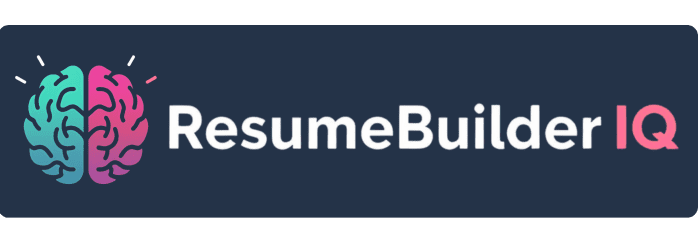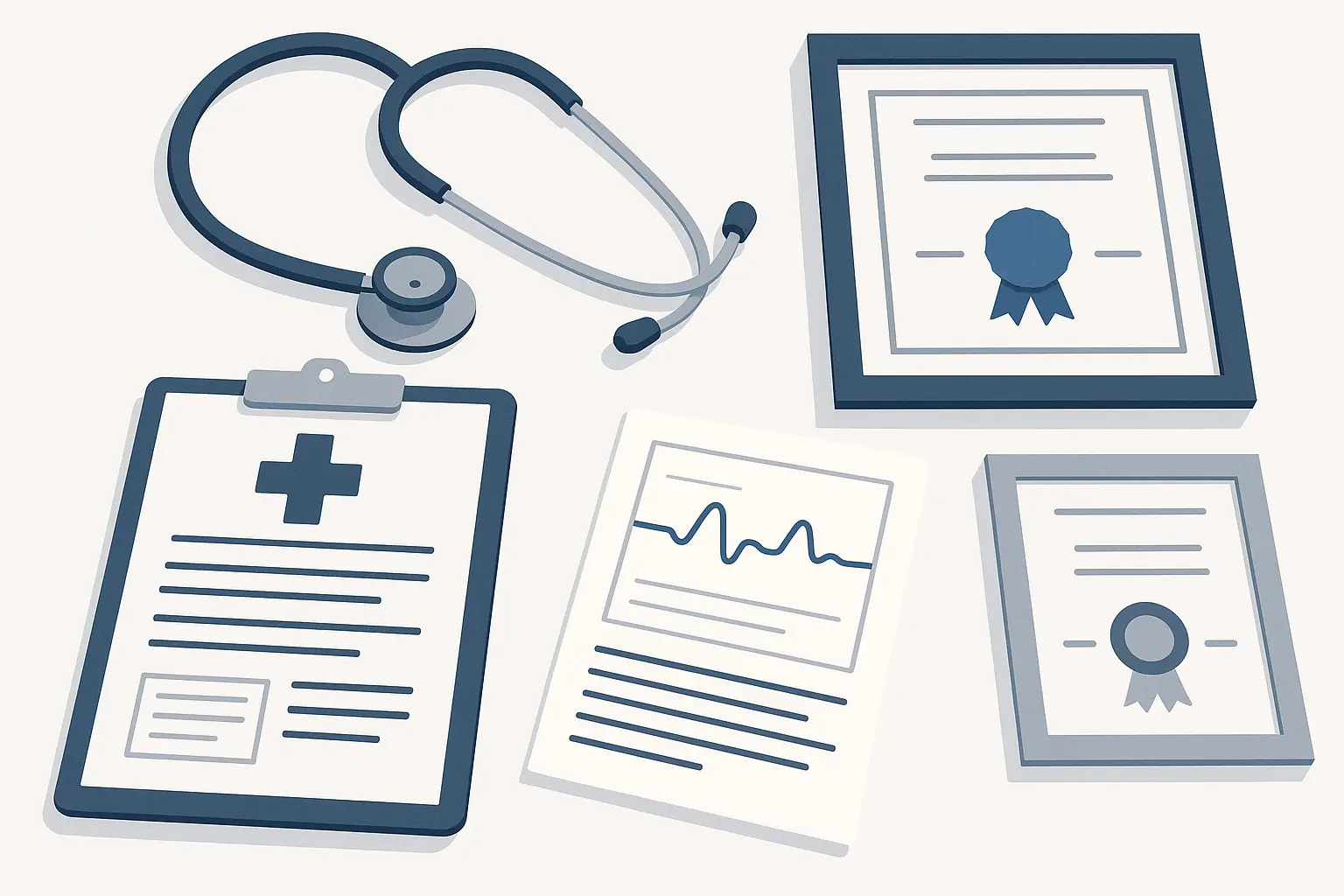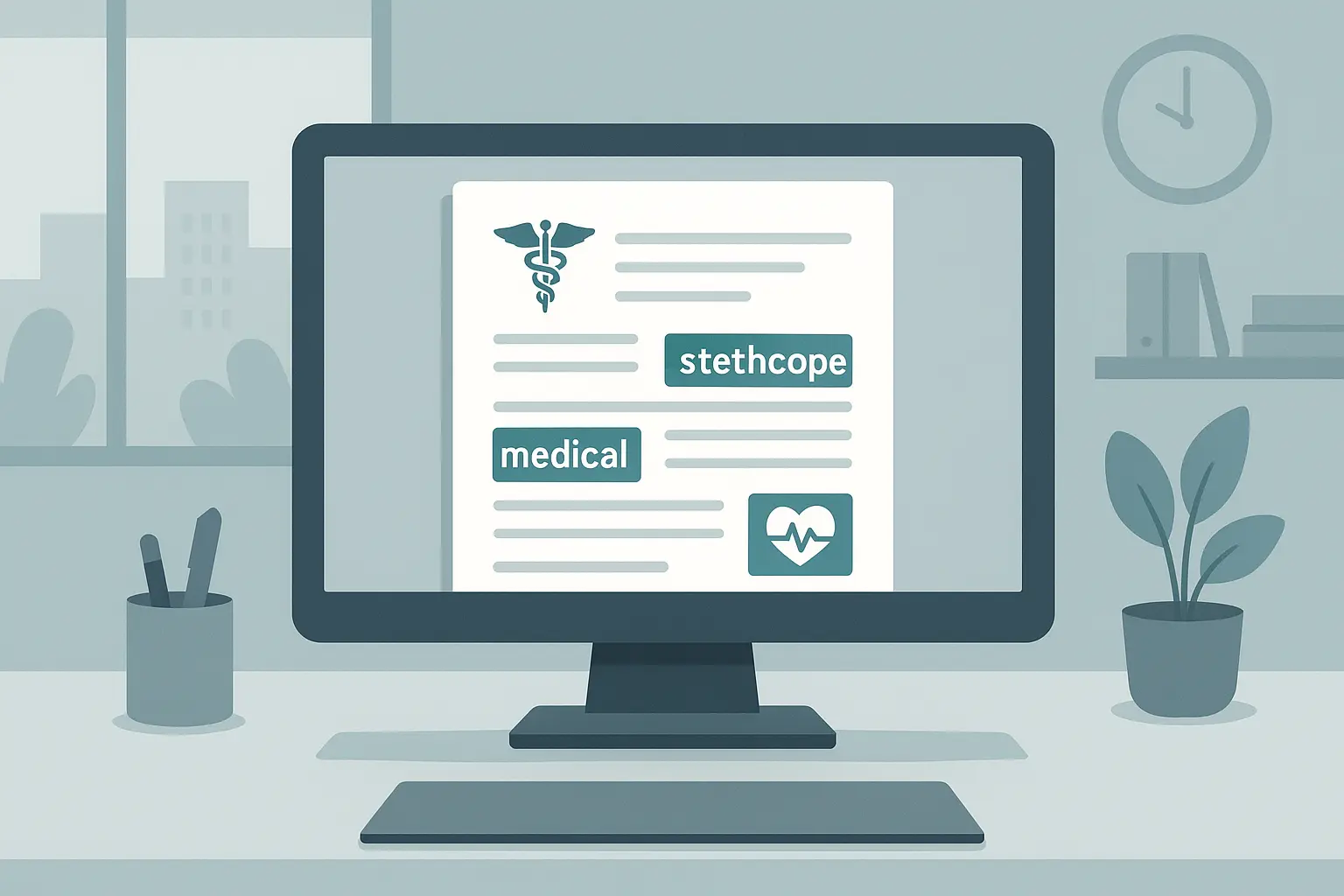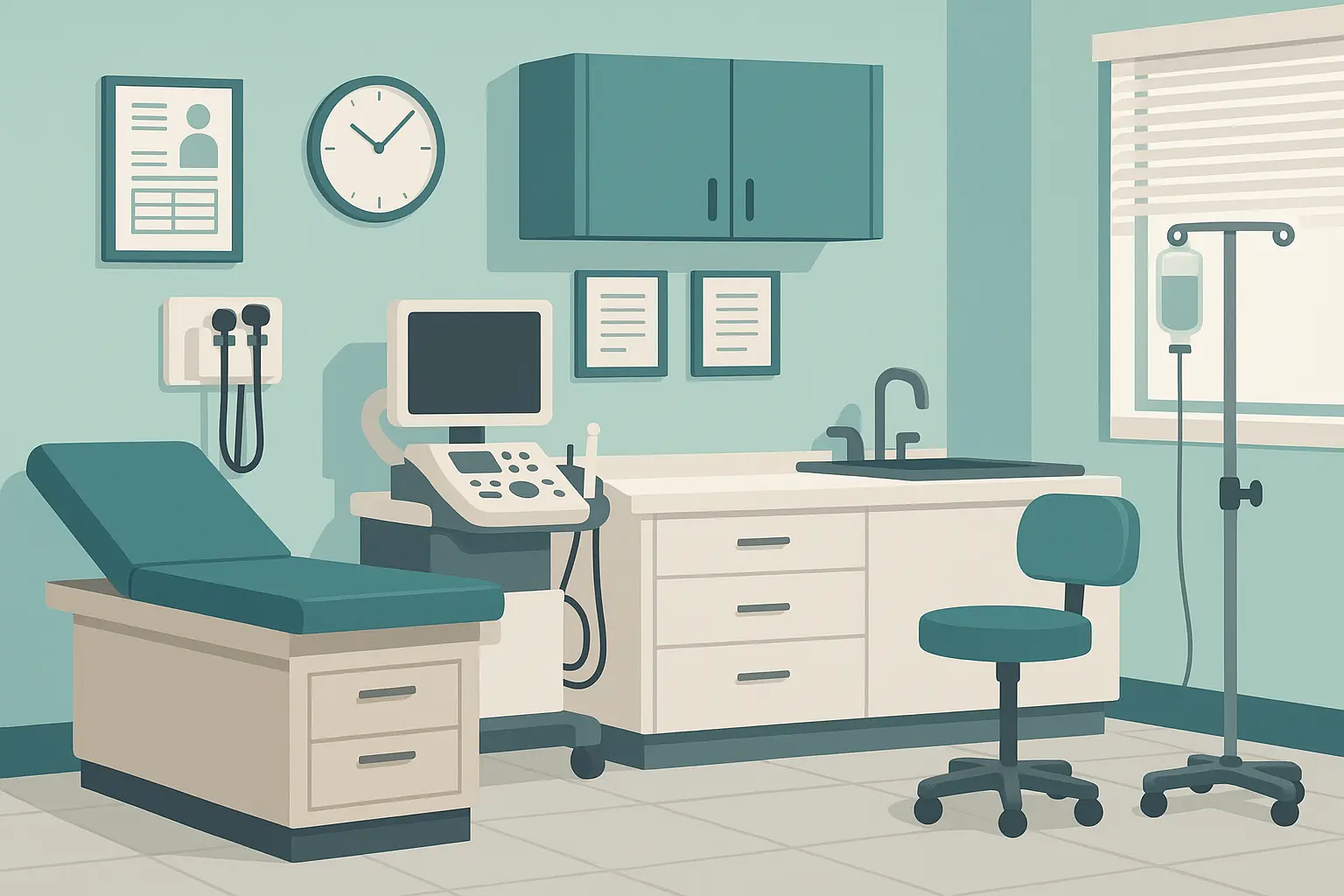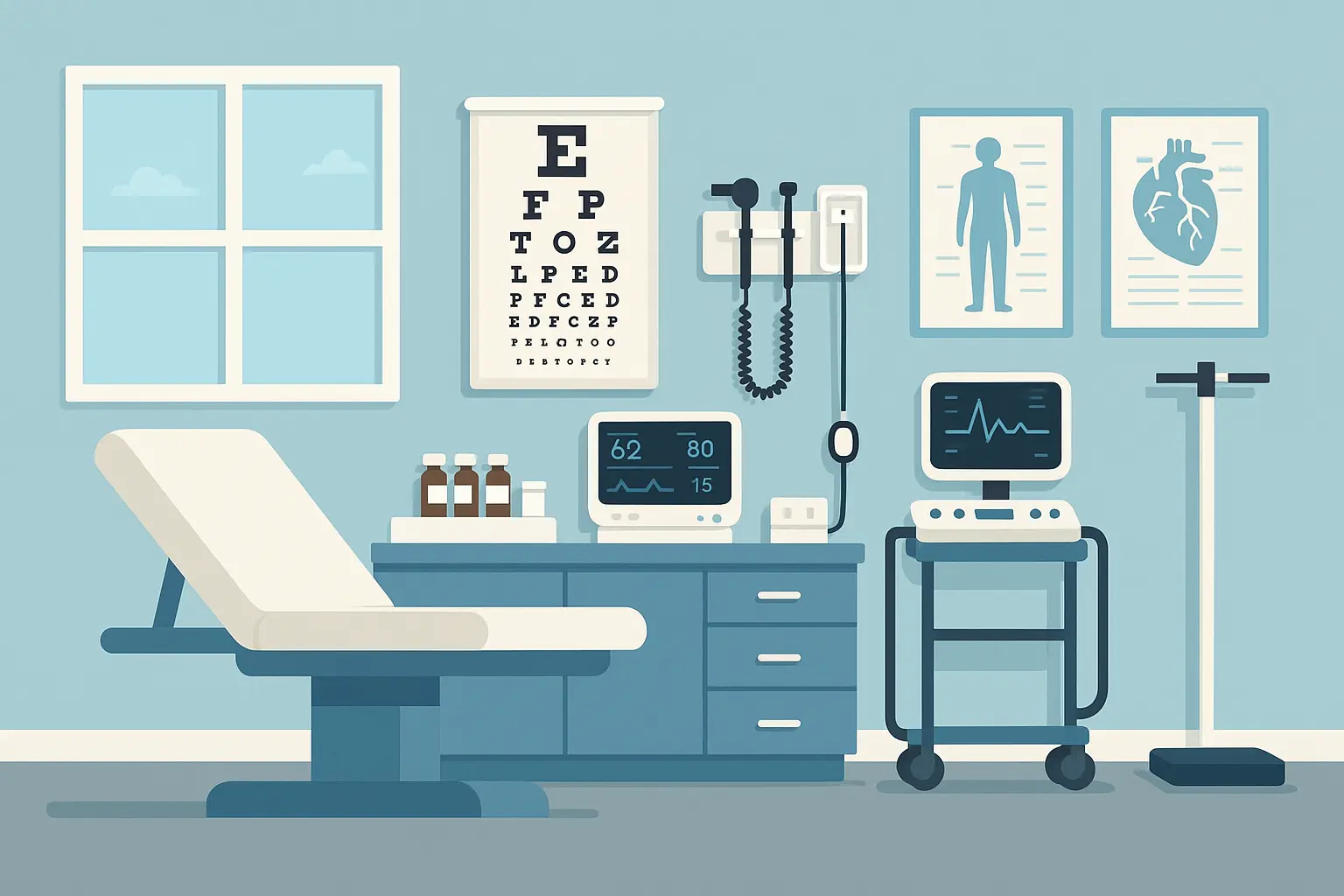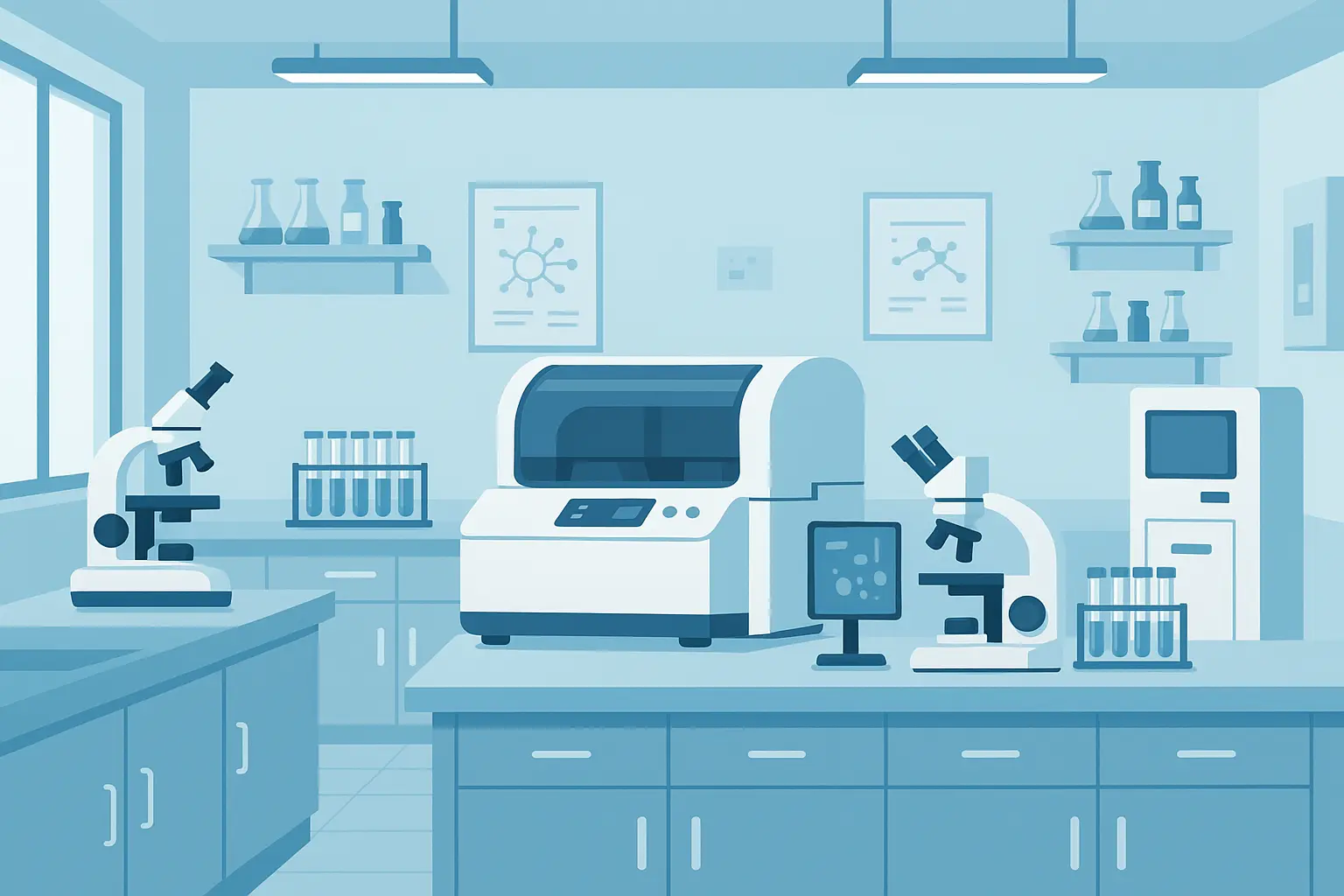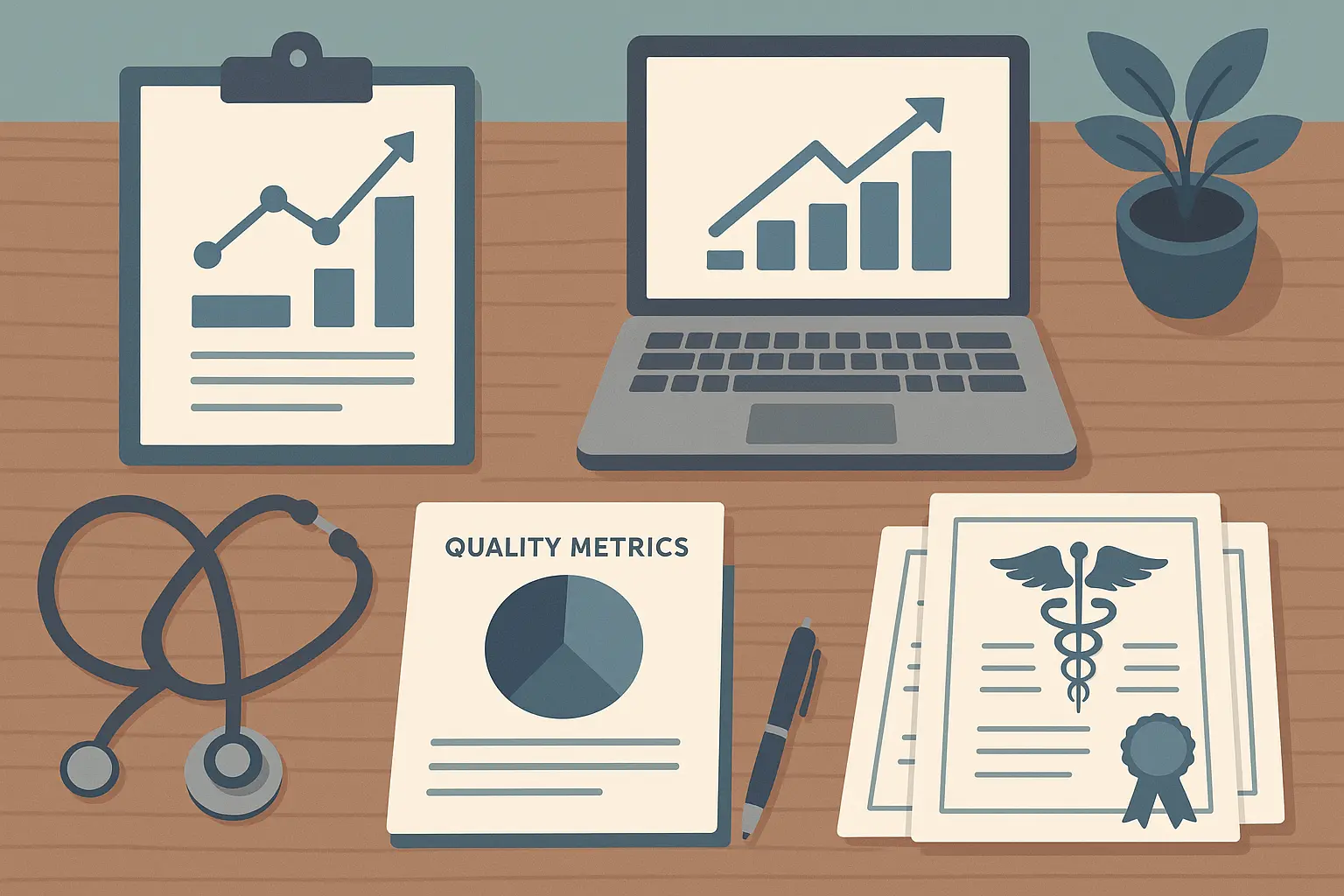25 Healthcare Resume Examples That Actually Get You Hired (Plus Expert Analysis)
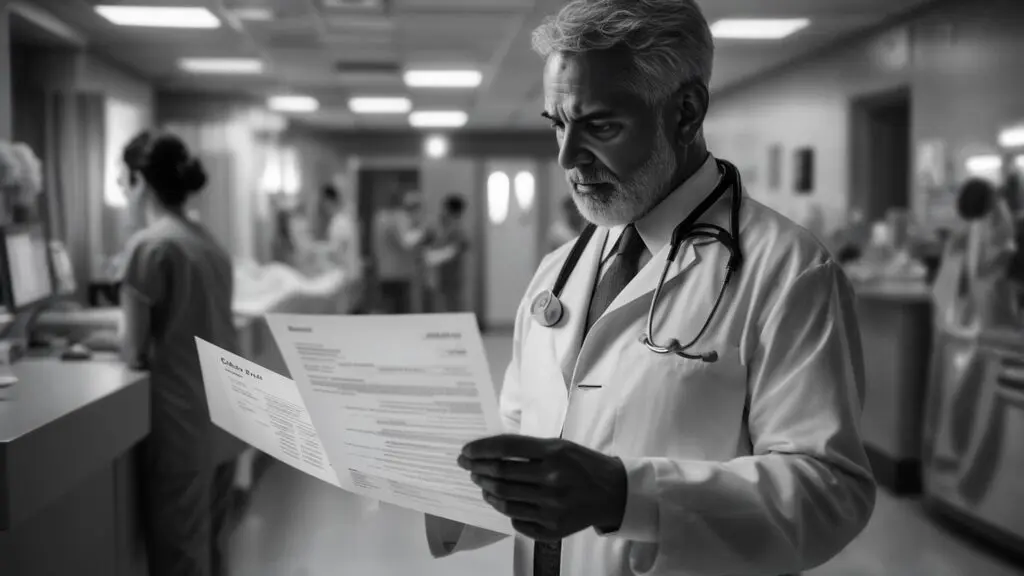
Look, if you’re a healthcare worker, you already know your resume isn’t like everyone else’s. You can’t just copy a template from someone in marketing and call it a day. Trust me, I’ve seen way too many talented nurses and doctors get passed over because their resume didn’t speak “healthcare.” With 13% job growth projected through 2031 according to the Bureau of Labor Statistics, the opportunities are there – but you need a resume that actually works.
This comprehensive guide gives you 25 proven healthcare resume examples across six specialized categories, from nursing to healthcare IT. You’ll get real examples that have gotten people hired, plus the inside scoop on what hiring managers actually look for when they’re drowning in applications.
Table of Contents
-
What Makes Healthcare Resumes Different From Other Industries
-
Understanding ATS Systems in Healthcare Hiring
-
Category 1: Nursing Professional Resume Examples (5 Examples)
-
Category 2: Physician and Advanced Practitioner Resume Examples (4 Examples)
-
Category 3: Allied Health Professional Resume Examples (5 Examples)
-
Category 4: Healthcare Administration Resume Examples (4 Examples)
-
Category 5: Mental Health and Behavioral Health Resume Examples (4 Examples)
-
Category 6: Specialized Healthcare Role Resume Examples (3 Examples)
-
Expert Analysis: What Makes These Healthcare Resumes Effective
-
Common Healthcare Resume Mistakes to Avoid
-
How Resume Builder IQ Optimizes Healthcare Resumes
-
Final Thoughts
TL;DR
Here’s what you need to know if you’re in a hurry:
-
Healthcare resumes need specialized formatting that shows off your clinical skills, certifications, and actual patient outcomes – not just job duties
-
75% of healthcare organizations use computer screening systems, so your resume needs to get past the robots before humans see it
-
Each healthcare specialty needs a different approach – what works for nursing won’t work for administration
-
Numbers matter more than fancy words. “Reduced medication errors by 35%” beats “provided excellent patient care” every time
-
Get your certifications and licensing info right, or you’re out before you even start
-
Mental health and specialized roles need unique formatting that most people get wrong
What Makes Healthcare Resumes Different From Other Industries
Your healthcare resume needs to do things that other resumes don’t. You’re not selling widgets or managing social media accounts – you’re trusted with people’s lives, and your resume needs to show that level of responsibility and competence.
When you’re applying for healthcare jobs, remember that the person reading your resume might be the same nurse manager who’s been working double shifts because they can’t find good people. They don’t have time for fluff. They want to know: Can you handle the job? Will you show up? And most importantly – will you keep their patients safe?
Here’s the thing that trips up most healthcare workers: your credentials aren’t just nice-to-have additions like they are in other fields. Your nursing license number, board certifications, and continuing education credits aren’t optional – they’re literally what allow you to do your job legally. Miss these details or get them wrong, and you’re done.
Stop underselling yourself when it comes to patient outcomes. That time you caught a medication error before it reached the patient? That’s not just “attention to detail” – that’s literally saving someone from harm. Your resume should tell these stories with real numbers: “Maintained 98% medication administration accuracy across 15-patient daily assignments with zero safety incidents over 18 months.”
|
Healthcare Resume Element |
Traditional Resume |
Healthcare-Specific Requirement |
|---|---|---|
|
Credentials |
Optional certifications |
Mandatory licenses with numbers and expiration dates |
|
Metrics |
Revenue/profit focus |
Patient safety and care quality outcomes |
|
Compliance |
General business regulations |
HIPAA, Joint Commission, CMS requirements |
|
Terminology |
Industry jargon acceptable |
Medical precision with accessibility balance |
|
Continuing Education |
Nice to have |
Required for license maintenance |
Every healthcare resume has to navigate regulatory compliance. HIPAA knowledge isn’t something you mention if you have room – it’s expected. Joint Commission standards, CMS requirements, and state-specific regulations all need to show up in how you present your experience. But here’s the trick: you need to show you know this stuff without drowning the reader in alphabet soup.
The medical terminology you use tells hiring managers whether you actually know what you’re talking about. Use precise medical language to show expertise, but don’t go overboard with jargon that might confuse HR people who screen resumes first. Understanding this balance becomes crucial when crafting a professional resume format that works for both clinical and administrative reviewers.
Understanding ATS Systems in Healthcare Hiring
Here’s the truth nobody tells you: those computer systems (ATS) that screen resumes before humans see them? They’re looking for specific words. Not fancy words, not creative descriptions – just the exact terms that match the job posting. So if the job says “ICU experience,” don’t write “critical care background.” Use their words, not your creative interpretation.
Healthcare organizations process thousands of applications every month, which is why most major health systems use automated screening to manage the chaos. These computer gatekeepers scan your resume for specific healthcare keywords, proper formatting, and credential verification before any human ever sees your application.
The keywords that actually matter in healthcare ATS systems go way beyond basic job titles. These systems hunt for specific certifications (BLS, ACLS, PALS), medical equipment names (ventilators, EPIC, Cerner), and clinical procedures (IV insertion, wound care, medication administration). Miss these terms and your resume gets tossed, no matter how qualified you are.
Creating an ATS-friendly resume becomes even more critical in healthcare settings where automated systems must parse complex medical terminology and certification requirements. Here’s where most healthcare workers mess up: they get creative with formatting. Those fancy graphics and unusual fonts that look nice to you? They completely confuse ATS systems, potentially scrambling your carefully written content.
ATS-Optimized Healthcare Keywords Example:
– Instead of: “Worked with patients in critical care”
– Use: “Provided comprehensive nursing care to ICU patients requiring mechanical ventilation, hemodynamic monitoring, and ACLS protocols”
This revision includes specific medical equipment (mechanical ventilation, hemodynamic monitoring) and certification keywords (ACLS) that ATS systems actually recognize and score positively.
Some ATS systems now cross-reference license numbers with state databases, automatically flagging expired or invalid credentials. This makes accurate, up-to-date licensing information absolutely critical – one wrong digit and you’re out.
Healthcare ATS algorithms prioritize patient safety indicators, compliance metrics, and outcome measurements. Healthcare resume examples that quantify these elements perform significantly better in automated screening than those focusing solely on responsibilities and duties.
Category 1: Nursing Professional Resume Examples (5 Examples)
Nursing resumes need to balance clinical competencies, patient care metrics, and professional development without looking like a medical textbook. These five examples show how different nursing specialties present their qualifications, from med-surg units to advanced practice roles. Each one demonstrates proper credential presentation, patient outcome quantification, and specialty-specific skill highlighting that actually gets noticed by nursing managers and ATS systems.
1. Registered Nurse (RN) – Medical/Surgical Unit
This medical-surgical RN resume gets the basics right from the start. The header shows “RN” credentials right next to contact information – no hunting around to figure out if this person is actually licensed.
The professional summary captures the real deal in three lines: “Experienced Medical-Surgical RN with 5+ years providing comprehensive care to 12-15 patients daily. Achieved 99% medication administration accuracy and reduced patient falls by 30% through proactive safety protocols.”
See how specific that is? Not “provided excellent patient care” but actual numbers that show impact. The core competencies section lists both technical skills (IV insertion, wound care, medication administration) and the soft skills (patient education, family communication) that make or break success on med-surg units.
Professional experience tells the real story with quantified achievements. Instead of boring job duties, this resume states: “Managed comprehensive care for 12-15 medical-surgical patients daily, maintaining 98% patient satisfaction scores while reducing medication errors to zero over 12-month period.”
The education section includes BSN degree with graduation year and institution. Licenses and certifications get their own section with RN license number and state, plus required certifications (BLS, ACLS) with expiration dates clearly visible. Professional affiliations show ongoing engagement with nursing organizations.
2. Nurse Practitioner (NP) – Family Practice
Advanced practice nursing needs different resume emphasis than bedside nursing. This NP resume leads with board certification credentials (MSN, FNP-C) right in the header, immediately showing advanced practice authority.
The professional summary emphasizes clinical decision-making and patient population diversity: “Board-certified Family Nurse Practitioner managing primary care for 1,200+ patients annually across all age groups. Reduced diabetic patient A1C levels by average 1.2% through evidence-based care protocols.”
Clinical experience section replaces traditional “work experience” to emphasize autonomous practice. Each position shows patient volume statistics, outcome improvements, and collaborative relationships with physicians and specialists.
Prescriptive authority and scope of practice get explicit mention – crucial for NP positions. This resume demonstrates understanding of independent practice regulations while showing collaborative care abilities.
Education section highlights advanced degree progression from BSN to MSN, showing clear career advancement. Board certifications section includes maintenance dates, demonstrating ongoing competency requirements.
3. Critical Care Nurse – ICU
ICU nursing demands specialized skills, and this resume puts them front and center. The professional summary immediately establishes critical care expertise: “Dedicated Critical Care Nurse managing 2-3 high-acuity patients requiring mechanical ventilation, hemodynamic monitoring, and complex medication protocols.”
The technical competencies section reads like an ICU equipment manual: mechanical ventilation, IABP, CRRT, hemodynamic monitoring, and emergency response protocols. These specific terms trigger ATS systems while showing hiring managers the candidate actually understands critical care complexity.
Professional experience quantifies the intensity of ICU work: “Managed 2-3 critically ill patients requiring continuous monitoring and complex interventions. Operated advanced life support equipment including ventilators, IABP, and CRRT while maintaining zero medication errors over 18 months.”
Specialized certifications (CCRN) get prominent placement, as these credentials distinguish critical care nurses from general medical-surgical nurses. The resume shows clear progression from general nursing to specialized critical care practice.
Mentoring experience demonstrates leadership potential: “Mentored 12 new graduate nurses in critical care competencies, contributing to 95% retention rate in new graduate program.”
4. Pediatric Nurse
Pediatric nursing requires age-specific competencies that this resume highlights effectively. The professional summary establishes pediatric expertise: “Compassionate Pediatric Nurse with 6+ years caring for infants through adolescents in acute care settings.”
Age-specific skills section includes developmental assessment, family-centered care, child life support, and pediatric medication calculations. These competencies distinguish pediatric nurses from adult care specialists.
Professional experience emphasizes family involvement and age-appropriate care techniques: “Provided comprehensive nursing care to pediatric patients ages newborn to 18 years, incorporating family-centered care principles and age-appropriate communication techniques.”
Pediatric certifications (PALS, pediatric advanced life support) receive prominent display. These specialized credentials are often required for pediatric positions and demonstrate commitment to child-specific care.
The resume shows understanding of pediatric growth and development principles, crucial for providing age-appropriate care and education to patients and families.
5. Travel Nurse
Travel nursing requires unique resume elements that this example demonstrates effectively. The professional summary emphasizes adaptability: “Experienced Travel Nurse with assignments across 8 states and 12 healthcare facilities. Quickly adapts to new environments while maintaining high-quality patient care standards.”
Multiple state licenses section becomes crucial for travel nurses, as assignments often cross state boundaries. The resume lists all active licenses with numbers and expiration dates clearly visible.
Professional experience shows diverse clinical experiences across different healthcare systems: “Completed 13-week assignments in medical-surgical, telemetry, and emergency departments, consistently receiving positive evaluations and contract extensions.”
Travel Nurse Adaptability Metrics:
– “Completed orientation requirements 25% faster than average while achieving full productivity within first week of each assignment”
– “Successfully adapted to 5 different EHR systems (EPIC, Cerner, Meditech, Allscripts, NextGen) across multiple assignments”
– “Maintained 98% patient satisfaction scores across 8 different healthcare facilities”
Adaptability metrics quantify the travel nurse’s ability to integrate quickly. The resume demonstrates flexibility with different electronic health record systems, staffing models, and hospital policies – essential skills for successful travel nursing careers.
For healthcare professionals looking to maximize their impact, exploring top nursing resumes can provide additional insights into how successful candidates present their clinical expertise and patient care achievements.
Category 2: Physician and Advanced Practitioner Resume Examples (4 Examples)
Physician resumes follow academic medical formatting that emphasizes medical education, board certifications, hospital affiliations, and clinical outcomes. These four examples show how different medical specialties present their qualifications, from emergency medicine to primary care. Each demonstrates proper credential hierarchy, research integration, and outcome quantification that medical staff offices and department chairs actually want to see.
6. Emergency Medicine Physician
Emergency medicine physician resumes follow academic medical formatting conventions. The header displays MD credentials and board certifications prominently: “Dr. Sarah Johnson, MD, ABEM” immediately establishes medical authority and specialty certification.
Professional summary emphasizes emergency medicine expertise and patient volume capacity: “Board-certified Emergency Medicine Physician with 8+ years managing high-acuity patients in Level I trauma center. Treated 4,000+ patients annually with 95% patient satisfaction scores.”
Clinical experience section quantifies the intensity of emergency medicine practice: “Managed emergency department with 50,000+ annual visits, treating everything from minor injuries to multi-trauma cases. Maintained door-to-doctor times under 15 minutes while achieving 98% patient satisfaction.”
Board certifications section includes initial certification dates and maintenance requirements. Emergency medicine board certification (ABEM) receives prominent placement, as this credential is mandatory for emergency department practice.
Hospital affiliations and privileges section demonstrates practice authority: “Active medical staff privileges at Metropolitan Medical Center with emergency department attending physician status.”
Research and publications section adds academic credibility. Even community emergency physicians benefit from showing scholarly activity through case presentations, quality improvement projects, or peer-reviewe
Research and publications section adds academic credibility. Even community emergency physicians benefit from showing scholarly activity through case presentations, quality improvement projects, or peer-reviewed publications.
7. Primary Care Physician – Internal Medicine
Internal medicine physicians need resumes that emphasize comprehensive care capabilities. The professional summary establishes primary care expertise: “Board-certified Internist providing comprehensive primary care to diverse adult population. Manages complex chronic diseases while emphasizing preventive care and patient education.”
Clinical experience focuses on patient panel size and outcome metrics: “Maintained patient panel of 2,000+ adults, achieving 90% diabetes control rates and 85% hypertension management success through evidence-based protocols.”
Chronic disease management receives specific emphasis, as this represents core internal medicine competency. The resume quantifies success rates for diabetes, hypertension, and other common conditions.
Electronic health record proficiency gets explicit mention, as primary care physicians spend significant time with documentation: “Proficient in EPIC electronic health record system with above-average efficiency metrics.”
Quality improvement initiatives demonstrate commitment to practice enhancement: “Led quality improvement project reducing hospital readmissions by 20% through enhanced discharge planning and follow-up protocols.”
8. Surgeon – Orthopedic
Surgical resumes require different emphasis than primary care physician resumes. The professional summary immediately establishes surgical volume and expertise: “Board-certified Orthopedic Surgeon performing 200+ procedures annually with 98% patient satisfaction and complication rates 40% below national average.”
Surgical expertise section lists specific procedures and techniques: “Specializes in total joint replacement, arthroscopic surgery, and sports medicine procedures. Proficient in robotic-assisted surgery and minimally invasive techniques.”
Professional experience quantifies surgical outcomes and volume: “Performed 800+ successful surgeries over 5-year period, including 300+ total joint replacements with 99% success rate and average length of stay 20% below national benchmark.”
Research and innovation section demonstrates commitment to advancing surgical techniques: “Published 25+ peer-reviewed articles on joint replacement outcomes and surgical technique innovations.”
Hospital affiliations include operating room privileges and department leadership roles: “Chief of Orthopedic Surgery at Regional Medical Center with full operating room privileges.”
9. Physician Assistant – Cardiology
Physician assistant resumes must clearly establish scope of practice and supervision arrangements. The professional summary emphasizes cardiology specialization: “Certified Physician Assistant specializing in cardiology with 6+ years experience in both inpatient and outpatient settings.”
Clinical competencies section lists cardiology-specific skills: diagnostic testing interpretation, cardiac catheterization assistance, pacemaker follow-up, and heart failure management.
Professional experience demonstrates autonomous practice within supervision requirements: “Managed cardiology clinic seeing 25+ patients daily, performing diagnostic procedures and adjusting medications under cardiologist supervision.”
Specialized procedures section shows advanced cardiology skills: “Assisted with 200+ cardiac catheterizations and performed 150+ stress tests with 98% accuracy in interpretation.”
Continuing education section demonstrates commitment to staying current with cardiology advances: “Completed 50+ hours annual continuing education in cardiovascular medicine and interventional cardiology.”
Category 3: Allied Health Professional Resume Examples (5 Examples)
Allied health professionals need resumes that emphasize technical competencies, specialized equipment proficiency, and patient interaction skills. These five examples demonstrate how different allied health specialties present their qualifications, from physical therapy to medical laboratory technology. Each shows proper certification presentation, technical skill highlighting, and outcome quantification specific to their healthcare discipline.
10. Physical Therapist
Physical therapy resumes must demonstrate both clinical expertise and patient outcome achievements. The professional summary establishes PT credentials and specialization: “Licensed Physical Therapist with 7+ years experience in outpatient orthopedic rehabilitation. Achieved 95% patient goal attainment rate through evidence-based treatment protocols.”
Treatment modalities section lists specific techniques and approaches: manual therapy, therapeutic exercise, modalities (ultrasound, electrical stimulation), and specialized techniques like dry needling or instrument-assisted soft tissue mobilization.
Professional experience quantifies patient outcomes and caseload management: “Managed caseload of 12-15 patients daily, achieving 90% functional improvement rates and 95% patient satisfaction scores through individualized treatment plans.”
Specialized populations section demonstrates expertise with specific patient groups: orthopedic post-surgical, sports injuries, geriatric rehabilitation, or neurological conditions.
Continuing education section shows commitment to advancing clinical skills: “Completed advanced certifications in manual therapy, dry needling, and sports rehabilitation techniques.”
11. Respiratory Therapist
Respiratory therapy resumes emphasize critical care competencies and life support skills. The professional summary establishes RT credentials: “Registered Respiratory Therapist with 8+ years experience in critical care and emergency settings. Managed mechanical ventilation for 200+ patients with 98% successful weaning rate.”
Technical competencies section reads like a respiratory equipment manual: mechanical ventilation, BIPAP/CPAP, arterial blood gas analysis, pulmonary function testing, and aerosol therapy administration.
Professional experience quantifies the intensity of respiratory care: “Managed mechanical ventilation for ICU patients, achieving 95% successful weaning rate and reducing ventilator-associated pneumonia by 30% through evidence-based protocols.”
Emergency response capabilities receive emphasis, as respiratory therapists often respond to codes and emergencies: “Responded to 150+ emergency calls annually, providing advanced airway management and life support interventions.”
Specialized certifications (RRT, RPFT) demonstrate advanced competency beyond basic respiratory therapy education.
12. Medical Laboratory Technologist
Laboratory technology resumes must emphasize technical accuracy and quality control expertise. The professional summary establishes MLT credentials: “Certified Medical Laboratory Technologist with 6+ years experience in high-volume clinical laboratory. Maintained 99.8% accuracy rate while processing 200+ specimens daily across multiple testing areas.”
Technical skills section lists laboratory disciplines: hematology, chemistry, microbiology, immunology, blood banking, and molecular diagnostics. Specific equipment proficiency (automated analyzers, microscopy, flow cytometry) demonstrates hands-on expertise.
Professional experience quantifies testing volume and accuracy metrics: “Processed 50,000+ laboratory specimens annually across hematology, chemistry, and microbiology departments while maintaining 99.9% accuracy rate and zero critical value delays.”
Quality assurance activities receive prominent mention: “Led quality control initiatives reducing testing errors by 25% and implemented new specimen tracking system improving turnaround times by 15%.”
Certifications section displays ASCP credentials and continuing education compliance, essential for laboratory practice.
13. Radiologic Technologist
Radiologic technology resumes emphasize imaging modalities and radiation safety protocols. The professional summary establishes RT credentials: “ARRT-certified Radiologic Technologist with 7+ years experience in diagnostic imaging. Maintained 99.8% image quality rating while ensuring optimal patient comfort and safety.”
Imaging modalities section lists specific equipment expertise: digital radiography, CT scanning, MRI, mammography, and fluoroscopy. Each modality requires specialized training and certification.
Professional experience quantifies imaging volume and quality metrics: “Performed 250+ imaging procedures weekly across multiple modalities, achieving 98% first-attempt success rate and maintaining radiation exposure levels 20% below recommended limits.”
Patient care emphasis shows the human side of radiologic technology: “Provided compassionate care to anxious patients, reducing procedure anxiety through clear communication and positioning techniques.”
Radiation safety protocols demonstrate understanding of ALARA principles and regulatory compliance requirements.
14. Pharmacy Technician
Pharmacy technician resumes emphasize accuracy, medication knowledge, and customer service skills. The professional summary establishes pharmacy credentials: “Certified Pharmacy Technician with 5+ years experience in retail and hospital settings. Maintained 99.9% prescription accuracy rate while processing 300+ prescriptions daily.”
Technical competencies include prescription processing, insurance billing, medication compounding, and inventory management. These skills demonstrate comprehensive pharmacy operations knowledge.
Professional experience quantifies prescription volume and accuracy metrics: “Processed 1,500+ prescriptions weekly with 99.8% accuracy rate, managed insurance claims with 95% first-pass approval rate, and maintained controlled substance compliance.”
Customer service skills receive emphasis, as pharmacy technicians interact directly with patients: “Provided medication counseling support and resolved insurance issues for 100+ patients daily.”
Specialized training in sterile compounding, chemotherapy preparation, or automated dispensing systems adds value for hospital positions.
Category 4: Healthcare Administration Resume Examples (4 Examples)
Healthcare administration resumes require business-focused formatting that emphasizes operational metrics, regulatory compliance, and financial management. These four examples demonstrate how different administrative roles present their qualifications, from healthcare management to medical office operations. Each shows proper quantification of cost savings, efficiency improvements, and compliance achievements that healthcare executives expect to see.
|
Healthcare Administration Role |
Key Metrics to Highlight |
Essential Certifications |
|---|---|---|
|
Healthcare Administrator |
Budget management, staff oversight, regulatory compliance |
MHA, FACHE, CPHQ |
|
Medical Office Manager |
Patient satisfaction, billing efficiency, workflow optimization |
CMOM, CPPM, CPC |
|
Health Information Manager |
Data accuracy, system implementations, privacy compliance |
RHIA, RHIT, CCS |
|
Quality Coordinator |
Safety metrics, compliance rates, improvement outcomes |
CPHQ, CQA, CPPS |
15. Healthcare Administrator/Manager
Healthcare administration resumes blend business management with healthcare-specific knowledge. The professional summary establishes leadership credentials: “Healthcare Administrator with 10+ years managing multi-department operations in 300-bed acute care facility. Reduced operational costs by 15% while improving patient satisfaction scores to 95th percentile.”
Core competencies section balances business skills with healthcare knowledge: budget management, regulatory compliance (HIPAA, Joint Commission, CMS), staff development, and quality improvement initiatives.
Professional experience quantifies operational improvements with specific metrics: “Managed $50M annual budget while overseeing 500+ staff members across nursing, ancillary, and support departments. Implemented efficiency initiatives reducing costs by $2.3M annually.”
Regulatory compliance achievements demonstrate healthcare-specific expertise: “Led successful Joint Commission accreditation survey with zero findings and maintained 100% HIPAA compliance through comprehensive staff training programs.”
Strategic planning capabilities show executive-level thinking: “Developed 5-year strategic plan resulting in 20% revenue growth and expansion of two new service lines.”
16. Medical Office Manager
Medical office management requires different skills than hospital administration. The professional summary establishes practice management expertise: “Medical Office Manager overseeing multi-physician primary care practice with 15,000+ patient encounters annually. Improved practice efficiency by 30% through workflow optimization.”
Practice management competencies include appointment scheduling, insurance verification, billing oversight, and staff coordination. These skills demonstrate comprehensive practice operations knowledge.
Professional experience quantifies practice improvements: “Managed daily operations for 8-physician practice, reducing patient wait times by 25% and improving collection rates to 98% through enhanced billing processes.”
Electronic health record implementation shows technology leadership: “Led successful EPIC implementation for 50-provider practice, completing transition 2 weeks ahead of schedule and 10% under budget.”
Staff development initiatives demonstrate leadership capabilities: “Recruited, trained, and supervised 25+ medical office staff, achieving 90% retention rate through comprehensive onboarding and development programs.”
17. Health Information Manager
Health information management combines technology expertise with healthcare knowledge. The professional summary establishes HIM credentials: “RHIA-certified Health Information Manager with 10+ years managing medical records and health information systems. Led EPIC implementation ensuring 100% HIPAA compliance.”
Technical competencies include health information systems, medical coding (ICD-10, CPT), data analytics, and privacy protection. These skills demonstrate comprehensive HIM knowledge.
Professional experience quantifies system improvements: “Managed health information department with 25 staff members, reducing medical record completion time from 72 hours to 24 hours through process improvements.”
Coding accuracy metrics demonstrate quality management: “Achieved 99.5% coding accuracy rate through staff training and quality assurance programs, resulting in optimal reimbursement and compliance.”
Data analytics capabilities show modern HIM skills: “Developed reporting dashboards providing real-time insights into clinical quality metrics and operational efficiency indicators.”
18. Healthcare Quality Coordinator
Quality coordination requires understanding of healthcare metrics and improvement methodologies. The professional summary establishes quality expertise: “Healthcare Quality Coordinator with 8+ years developing and implementing quality improvement programs. Reduced hospital-acquired infections by 40% through evidence-based protocols.”
Quality improvement competencies include performance measurement, regulatory compliance, data analysis, and staff education. These skills demonstrate comprehensive quality management knowledge.
Professional experience quantifies quality improvements: “Led quality improvement initiatives resulting in 25% reduction in patient falls, 30% decrease in medication errors, and 95th percentile patient satisfaction scores.”
Regulatory compliance achievements show healthcare-specific expertise: “Maintained compliance with Joint Commission, CMS, and state regulatory requirements through comprehensive monitoring and reporting systems.”
Staff education programs demonstrate leadership in quality culture development: “Developed and implemented quality training programs for 200+ clinical staff, achieving 98% competency rates.”
Category 5: Mental Health and Behavioral Health Resume Examples (4 Examples)
Mental health and behavioral health resumes require specialized formatting that emphasizes therapeutic competencies, crisis intervention skills, and treatment outcome metrics. These four examples demonstrate how different mental health specialties present their qualifications, from clinical social work to psychiatric nursing. Each shows proper licensing presentation, therapeutic approach highlighting, and patient outcome quantification specific to behavioral health practice.
19. Clinical Social Worker – Healthcare Setting
Healthcare social work resumes emphasize both clinical skills and healthcare system knowledge. The professional summary establishes dual competency: “Licensed Clinical Social Worker with 7+ years in acute care settings. Provided psychosocial assessments and discharge planning for 2,000+ patients annually.”
Clinical competencies include psychosocial assessment, crisis intervention, discharge planning, case management, and family counseling. These skills demonstrate comprehensive healthcare social work practice.
Professional experience quantifies patient interactions and outcomes: “Conducted psychosocial assessments for 15-20 patients daily, facilitated discharge planning reducing average length of stay by 1.2 days, and provided crisis intervention services.”
Interdisciplinary collaboration receives emphasis, as healthcare social workers work closely with medical teams: “Collaborated with physicians, nurses, and therapists to develop comprehensive discharge plans and coordinate community resources.”
Specialized populations section shows expertise with specific patient groups: medical/surgical, ICU, emergency department, or pediatric patients.
20. Mental Health Counselor
Mental health counseling resumes emphasize therapeutic expertise and treatment outcomes. The professional summary establishes counseling credentials: “Licensed Professional Counselor with 6+ years providing individual and group therapy. Achieved 85% treatment goal completion rate through evidence-based interventions.”
Therapeutic modalities section lists specific
Therapeutic modalities section lists specific approaches: cognitive-behavioral therapy, dialectical behavior therapy, trauma-informed care, and motivational interviewing. These demonstrate specialized training and competency.
Professional experience quantifies caseload and treatment outcomes: “Maintained caseload of 25-30 clients providing individual therapy, facilitated 3 weekly group sessions, and achieved 90% client retention rate.”
Documentation and compliance skills show understanding of mental health regulations: “Maintained comprehensive treatment records in compliance with state regulations and insurance requirements.”
Crisis intervention capabilities demonstrate ability to handle emergency situations: “Provided crisis intervention services including risk assessments and safety planning for high-risk clients.”
21. Substance Abuse Counselor
Substance abuse counseling requires specialized credentials and treatment approaches. The professional summary establishes addiction expertise: “Certified Addiction Counselor with 8+ years in residential and outpatient treatment settings. Achieved 70% treatment completion rate through individualized recovery planning.”
Addiction treatment competencies include assessment, treatment planning, group facilitation, relapse prevention, and family therapy. These skills demonstrate comprehensive addiction treatment knowledge.
Professional experience quantifies treatment outcomes and program success: “Provided individual and group counseling to 40+ clients monthly, facilitated 12-step programs, and achieved 65% long-term sobriety rates at 1-year follow-up.”
Evidence-based treatment modalities show current practice knowledge: motivational interviewing, cognitive-behavioral therapy, and trauma-informed care approaches.
Recovery support services demonstrate understanding of comprehensive addiction treatment: “Coordinated with medical providers, housing services, and vocational rehabilitation to support client recovery goals.”
22. Psychiatric Nurse
Psychiatric nursing combines nursing skills with mental health expertise. The professional summary establishes dual competency: “Board-certified Psychiatric Mental Health Nurse with 9+ years in inpatient and outpatient settings. Managed medication protocols for 200+ psychiatric patients annually.”
Mental health nursing competencies include psychiatric assessment, medication management, crisis intervention, therapeutic communication, and milieu therapy. These skills demonstrate specialized psychiatric nursing practice.
Professional experience quantifies patient care and outcomes: “Provided nursing care for 15-20 acute psychiatric patients daily, conducted mental status examinations, and facilitated therapeutic groups with 90% patient participation rates.”
Medication management expertise shows advanced psychiatric nursing skills: “Administered and monitored psychiatric medications, educated patients on medication compliance, and collaborated with psychiatrists on treatment adjustments.”
Crisis de-escalation capabilities demonstrate essential psychiatric nursing skills: “Responded to behavioral emergencies using therapeutic communication and de-escalation techniques, reducing use of restraints by 50%.”
Category 6: Specialized Healthcare Role Resume Examples (3 Examples)
Specialized healthcare roles require unique resume approaches that blend healthcare knowledge with industry-specific skills. These three examples demonstrate how non-traditional healthcare positions present their qualifications, from medical device sales to healthcare IT. Each shows proper integration of healthcare expertise with specialized technical or business skills that these hybrid roles demand.
23. Medical Device Sales Representative
Medical device sales combines healthcare knowledge with sales expertise. The professional summary establishes dual competency: “Medical Device Sales Representative with 6+ years selling orthopedic implants to hospitals and surgery centers. Exceeded sales quotas by average 125% while building relationships with 50+ surgeons.”
Product knowledge section demonstrates healthcare expertise: orthopedic implants, surgical instruments, minimally invasive technologies, and regulatory compliance (FDA, quality systems).
Professional experience quantifies sales achievements and relationship building: “Managed $3.2M territory achieving 130% of quota, introduced 5 new products generating $800K additional revenue, and maintained relationships with 75+ healthcare providers.”
Clinical support capabilities show healthcare value-add: “Provided intraoperative support for 200+ surgical procedures, trained surgical staff on new technologies, and conducted product education seminars.”
Regulatory knowledge demonstrates understanding of healthcare compliance requirements: “Maintained compliance with FDA regulations, hospital credentialing requirements, and quality system standards.”
24. Clinical Research Coordinator
Clinical research coordination requires understanding of both research methodology and healthcare regulations. The professional summary establishes research expertise: “Certified Research Coordinator with 8+ years managing Phase I-IV clinical trials. Successfully coordinated 45+ studies with 98% protocol compliance.”
Research competencies include protocol development, patient recruitment, regulatory compliance (GCP, FDA), data collection, and adverse event reporting. These skills demonstrate comprehensive clinical research knowledge.
Professional experience quantifies research management and outcomes: “Managed 8-12 concurrent clinical trials with 200+ active participants, achieved 95% patient retention rate, and maintained zero FDA audit findings.”
Clinical Research Coordinator Achievement Metrics:
– “Exceeded enrollment targets by 15% across 12 concurrent studies through strategic patient recruitment initiatives”
– “Maintained 98.5% data accuracy rate across all clinical trial documentation and regulatory submissions”
– “Achieved 100% audit readiness with zero critical findings during FDA inspections over 5-year period”
Regulatory compliance expertise shows understanding of research requirements: “Ensured compliance with Good Clinical Practice guidelines, FDA regulations, and institutional review board requirements.”
Patient recruitment and retention capabilities demonstrate essential research skills: “Developed recruitment strategies achieving enrollment targets 20% ahead of schedule and maintained 90% patient retention through comprehensive support programs.”
25. Healthcare IT Specialist
Healthcare IT combines technology expertise with healthcare-specific knowledge. The professional summary establishes dual competency: “Healthcare IT Specialist with 7+ years implementing and supporting electronic health record systems. Led EPIC implementations for 3 hospitals serving 100,000+ patients.”
Technical competencies include electronic health record systems (EPIC, Cerner, Allscripts), healthcare data analytics, HIPAA-compliant system administration, and network security in healthcare environments.
Professional experience quantifies technology implementations and support: “Led $2.5M EPIC implementation completed on time and under budget, trained 500+ clinical users, and maintained 99.9% system uptime.”
Healthcare-specific knowledge demonstrates understanding of clinical workflows: “Optimized clinical decision support tools reducing medication errors by 30% and implemented interoperability solutions improving care coordination.”
Security and compliance expertise shows understanding of healthcare IT requirements: “Maintained HIPAA compliance through comprehensive security protocols and conducted regular risk assessments ensuring data protection.”
Expert Analysis: What Makes These Healthcare Resumes Effective
Ever wonder why some healthcare resumes get interviews while others get ignored? After looking at thousands of successful healthcare applications, certain patterns emerge that separate the winners from the pile of “thanks, but no thanks” responses.
The most effective healthcare resumes follow predictable patterns that hiring managers recognize and appreciate. These aren’t fancy tricks or resume hacks – they’re fundamental elements that show you understand what healthcare employers actually need.
Quantified achievements separate exceptional healthcare resumes from mediocre ones. Instead of listing job duties, top performers present measurable outcomes. “Reduced medication errors by 35%” carries infinitely more weight than “administered medications safely.” Numbers provide concrete evidence of competency and impact that hiring managers can actually evaluate.
Proper credential presentation immediately establishes professional authority. Healthcare hiring managers scan for licenses, certifications, and educational credentials within seconds of opening a resume. Prominent placement of these qualifications prevents immediate elimination from consideration.
Industry-specific terminology demonstrates insider knowledge while remaining accessible to non-clinical reviewers. The best healthcare resumes use precise medical language without overwhelming readers with unnecessary jargon. This balance shows expertise while maintaining readability for HR departments that often screen resumes first.
Patient outcome emphasis transforms routine healthcare work into compelling narratives of impact. Successful resumes connect daily activities to patient benefits, showing how individual contributions improve care quality and safety outcomes.
|
Resume Element |
Ineffective Approach |
Effective Healthcare Approach |
|---|---|---|
|
Experience Description |
“Responsible for patient care” |
“Managed 12-patient assignment achieving 98% satisfaction scores” |
|
Skills Presentation |
Generic bullet list |
Healthcare-specific competencies with equipment/systems |
|
Achievements |
Vague accomplishments |
Quantified patient outcomes and safety metrics |
|
Education |
Basic degree information |
Credentials with license numbers and renewal dates |
|
Technology Skills |
General computer skills |
EHR systems, medical equipment, healthcare software |
Compliance and safety metrics receive prominent attention in effective healthcare resumes. Hiring managers look for evidence of regulatory knowledge, safety consciousness, and quality improvement participation. These elements demonstrate understanding of healthcare’s high-stakes environment.
Professional development indicators show commitment to staying current with healthcare advances. Continuing education, specialty certifications, and professional organization membership signal dedication to career growth and clinical excellence.
Technology proficiency has become essential for modern healthcare resumes. Electronic health record experience, medical equipment operation, and healthcare-specific software knowledge demonstrate readiness for contemporary healthcare environments.
Common Healthcare Resume Mistakes to Avoid
Look, I get it. You just finished a 12-hour shift, your feet are killing you, and the last thing you want to do is worry about resume formatting. But here’s the thing – healthcare professionals often sabotage their own applications through preventable mistakes that eliminate them from consideration despite strong qualifications.
Generic resume templates designed for business professionals fail miserably in healthcare settings. Healthcare resumes require specialized formatting that accommodates licenses, certifications, clinical competencies, and patient care metrics. Using standard business templates creates formatting problems and misses healthcare-specific requirements entirely.
Outdated or missing certification information immediately disqualifies healthcare candidates. Expired licenses, missing certification numbers, or incorrect renewal dates signal non-compliance with basic professional requirements. Healthcare hiring managers verify this information, making accuracy absolutely essential.
Vague patient care descriptions waste valuable resume space. Phrases like “provided excellent patient care” or “worked with diverse populations” tell hiring managers absolutely nothing about your actual capabilities. Specific examples with quantified outcomes demonstrate real competency.
Overemphasis on job duties rather than achievements creates boring, ineffective resumes. Healthcare hiring managers want to see impact, not just responsibilities. Focus on what you accomplished, not what you were supposed to do.
Poor ATS optimization eliminates qualified candidates before human review, which is why understanding ATS resume format requirements becomes crucial for healthcare professionals navigating automated screening systems. Healthcare organizations increasingly use automated screening systems that require specific keywords, proper formatting, and standard section headers. Ignoring ATS requirements means your resume never reaches hiring managers.
Missing soft skills presentation overlooks crucial healthcare competencies. Communication, empathy, teamwork, and stress management are essential healthcare skills that many resumes completely ignore. These capabilities often determine success more than technical skills alone.
Inconsistent formatting and presentation suggest lack of attention to detail – a critical concern in healthcare settings. Spelling errors, formatting inconsistencies, and poor organization raise serious questions about professional competency and patient safety awareness.
How Resume Builder IQ Optimizes Healthcare Resumes
Creating an effective healthcare resume requires more than just listing your experience – it demands strategic presentation that speaks to both human recruiters and ATS systems. Resume Builder IQ becomes your competitive advantage in the healthcare job market by understanding these unique requirements.
Our AI-powered healthcare optimization automatically incorporates medical terminology, compliance keywords, and industry-standard formatting that healthcare recruiters expect to see. The system recognizes when you’re applying for nursing positions versus physician roles, adjusting keyword density and formatting accordingly.
Healthcare-specific templates designed by industry experts ensure your certifications, licenses, and clinical competencies receive proper prominence. These templates include dedicated sections for continuing education credits, specialty certifications, and patient outcome metrics that generic resume builders completely overlook.
The platform’s content suggestions help transform basic job descriptions into compelling achievement statements. Instead of writing “provided patient care,” Resume Builder IQ suggests “delivered evidence-based nursing care to 12-15 patients daily, achieving 98% medication administration accuracy and zero safety incidents.”
Time-saving features recognize that healthcare professionals work demanding schedules. You can create a professional, ATS-optimized resume during breaks between shifts or update certifications on your mobile device without being tied to a desktop computer.
Multiple format downloads ensure you’re prepared for any application requirement. Healthcare applications often need both PDF formats for visual impact and text formats for ATS compatibility – Resume Builder IQ provides both with a single click.
The mobile-responsive platform allows you to maintain your resume anywhere, whether you’re adding a new certification between patient rounds or updating your experience during a brief break. This flexibility helps busy healthcare professionals keep their career documents current without disrupting patient care responsibilities.
For healthcare professionals seeking additional guidance on presenting their qualifications effectively, exploring medical assistant resume examples can provide valuable insights into how different healthcare roles showcase their clinical competencies and patient care achievements.
Final Thoughts
Healthcare resume writing isn’t just about listing your qualifications – it’s about strategically presenting your clinical expertise in ways that resonate with both automated systems and human decision-makers. The 25 healthcare resume examples we’ve explored demonstrate that successful healthcare resumes share common elements: quantified patient outcomes, proper credential presentation, and industry-specific terminology that signals professional competency.
Your healthcare career deserves a resume that accurately reflects your dedication to patient care and clinical excellence. Whether you’re a new graduate nurse entering the field or an experienced physician seeking career advancement, the principles demonstrated in these examples provide a roadmap for creating compelling applications that generate interviews.
The healthcare industry’s continued growth means opportunities exist for qualified professionals who can effectively communicate their value. By applying the strategies shown in these examples – from proper ATS optimization to compelling achievement quantification – you position yourself for success in this rewarding but competitive field.
For those looking to complement their healthcare resume with additional application materials, understanding how to write a cover letter that gets noticed can further enhance your job search strategy and demonstrate your communication skills to potential employers.
Remember that your resume represents more than just your work history; it reflects your commitment to healthcare excellence and patient safety. Take the time to craft a document that honors both your professional achievements and the trust patients place in healthcare providers every day.
